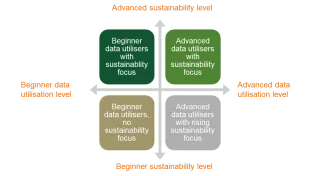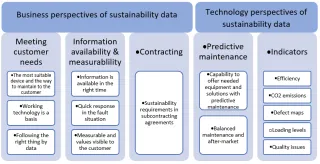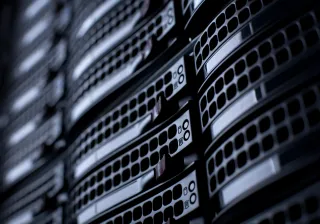A lot of data is needed in determining, measuring, verifying and communicating operations in line with sustainable development. Combining sustainability and data utilization may still be challenging in the manufacturing industry.
We drew up the following definition of sustainability data: Sustainability data is any kind of data that enables sustainable innovations in companies, raises or indicates the level of practical implementation of sustainability.
Sustainability data is not just about measuring energy efficiency, for example, but it encompasses many different things. Sustainable development includes social, economic and environmental aspects, which means that a wide variety of data is linked to it. Sustainability data can be active, i.e. enable new innovations related to sustainability or contribute to the development of sustainability level. On the other hand, it can also be passive, i.e. monitoring and presenting sustainability in annual sustainability reports. Active data can become regularly monitored indicators of change.
Sustainability and data utilization in companies
We interviewed the management of five manufacturing companies about sustainability. The companies were equipment manufacturers in the forest, packaging, glass processing, machine vision and metal industries. The total number of interviewees was 12. Based on the results, we identified how goal-oriented companies are in terms of sustainability and how advanced the utilization of data is now (Figure 2). Respondents were allowed to place their own company in different compartments of the four fields. There was also a lot of dispersion in the responses within the company. A large number of the respondents thought that their company was at the top right of the graph, i.e. advanced data users who also have sustainable development goals.

Sustainability data still requires companies’ actions
We also looked at how the companies interviewed see sustainable operations and related data. Interviewees said that sustainability includes a forward-looking responsible approach and practical measures. Sustainability data, on the other hand, included perspectives related to both business and technologies (Figure 3). Business-related perspectives included responding to customer needs, timeliness and measurability of information, and the contractual requirements from the customers' direction in the co-operation relationship. Technology aspects were related to predictive maintenance and various indicators.

Sustainable activities include environmental, economic, and social aspects. However, Figure 3 shows that the manufacturing companies interviewed still look at sustainability data quite narrowly. There are lots of research data and visions available on sustainable development. In companies, however, the need is more practical on how to turn sustainability into practical actions that can be measured, monitored and promoted.
According to our experience, it would be worthwhile for a company in the manufacturing industry to identify regarding sustainability data:
- market and customer needs for conclusions and measures to be taken from sustainability data
- possibilities and business potential of sustainability data utilisation
- potential sustainability data sources comprehensively (environmental, economic and social perspectives), including missing data sources
- practical measures to utilize sustainability data
The research behind the blog has been carried out in the DataAsset (Sustainable data-based business for manufacturing industry) project, which has been funded by VTT Technical Research Centre of Finland and Business Finland in addition to the companies involved.






